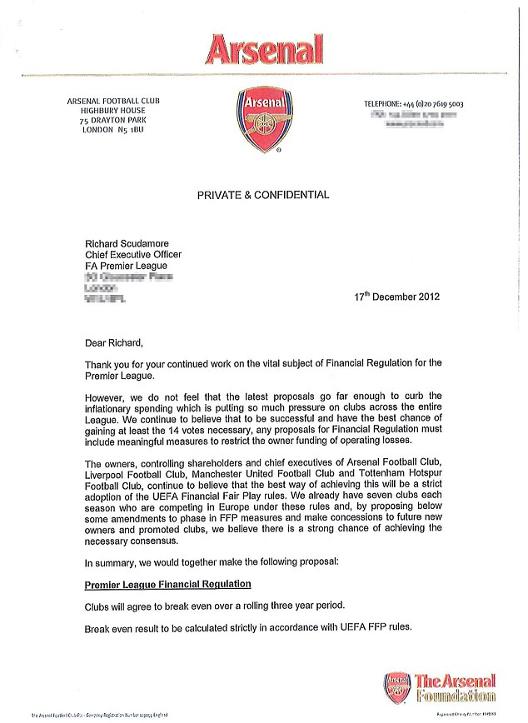Premier League clubs adopt spending constraints
Premier League clubs have voted to introduce spending constraints. I will cover-off the changes over the next few days and look at any anomalies within the rules – however, at the moment much of the information is still to reach the public domain. The Premier League’s communication of the new rules can be round here. For now, it is interesting to look at how the Premier League executives managed to get the rules over the line.
If you look on the Premier League’s website, the one term you will not find to describe the changes is ‘Financial Fair Play’. The Premier League have always been quick to point out that they have long had many of the components of UEFA’s FFP rules – the only part that was missing (until now) has been some kind of spending restriction.
Premier League Chief Executive Richard Scudamore has been keen to introduce some aspect of ‘Break Even’ restrictions since he was given some fairly direct questioning by the Parliamentary Select Committee on Football Governance. He was put on the spot and asked what assurances could he give that the increased TV revenue (due from 2013/14) wouldn’t be wasted again on wages and transfer fees. Scudamore was able to announce that he was about to establish a Working Group focussed on introducing spending constraints. Initially, the noises coming out of the Premier League were very much along the lines that people should not get their hopes up and that many Working Parties are set up without ultimately delivering any change. However, parliament and journalists kept up the pressure and the final Parliamentary report declared a distinct lack of conviction that the Premier League would ultimately deliver change (see sections 81 and 84). The report even threatened government licensing of the Premier League clubs if some FFP-style rules were not introduced – this was something Scudamore was very keen to avoid.
Against this background, and sensing a sea-change in public and political opinion, the politicians of the Premier League swung their energy behind the forces for change. Pressure was put on Premier League owners and Abramovic and Al Fayed were influenced into converting the club debts into equity. Crucially, when it appeared that there was an impasse within the Premier League Chairmen, Scudamore was able to apply pressure, influence and managed to cajole the disparate self-interested clubs into supporting the change. In the end, it was a close-run thing. For the proposal to be passed, two-thirds (66.67%) of votes cast had to support the change. In the end, six clubs voted against and one club abstained meaning 68.4% voted for the change. The clubs that voted against the changes were:
Against: Man City, Fulham, Aston Villa, West Brom, Swansea, Southampton.
Abstained: Reading abstained
In the weeks running up to the vote, Arsenal, Spurs, Man Utd and Liverpool joined together and lobbied the Premier League to push for rules that prevented wealthy owners putting money into clubs. The Mail published a leaked letter from the gang of four explaining their position:

Such a change would have hit clubs that operate on a ‘wealthy benefactor model’ (such as Chelsea, City, Fulham, Villa). City and Chelsea are opposed to any change that would overly restrict the owner being able to put their hand in their pocket and finance the club. Clearly clubs were lobbying out of self-interest and wanted to gain an advantage over their rivals.
Interestingly, West Brom voted in a different way to how we we might have expected. West Brom took highly principled position; they believe that, as they are able to balance their books and not run up debt, no restrictions are required. It appears that Swansea may have taken a similar view.
Whe Reading and Southampton were in the Championship, they both voted against FFP rules being introduced - so perhaps it is no surprise that they took a consistent position and neither voted in favour this time (although Reading abstained).
Chelsea’s position is interesting. They were originally against all spending constraints but have been won round by Premier League influence and the concession that permits clubs to lose up to £105m over three seasons (starting next season in 2013/14). This of course is a long way from ‘Break Even’ and considerably in excess of UEFA's E30m maximum Break Even Deficit figure that is in operation over the three corresponding seasons.
It looks like the new rules will be enough to keep the threat of government licensing at bay and the initial government respons has been favourable.
I will analyse and explain the mechanics, the impact and idiosyncrasies of the rules over the next few days.
blog comments powered by Disqus
